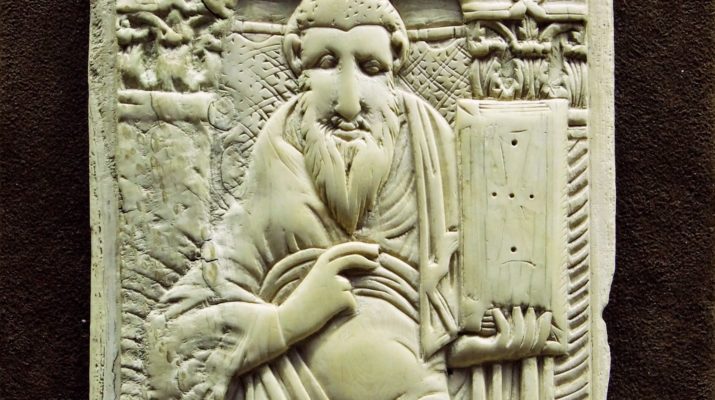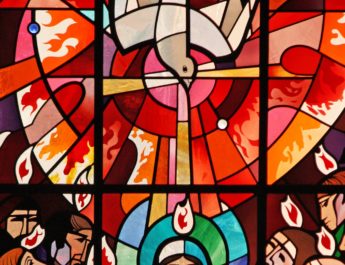Acts 17:1-9
NL 242
1 After Paul and Silas had passed throughI AmphipolisII and Apollonia,III they cameIV
I “passed through” = diodeuo. 2x in NT. From dia (through, for the sake of, across, thoroughly) + hodeuo (to travel or journey); {from hodos (way, road, path, journey)}. This is to travel through, go around, go on.
II “Amphipolis” = Amphipolis. 1x in NT. From the same as amphoteroi (both, all); {from ampho (around, both sides)} + polis (a city or its inhabitants; is a town of variable size, but one that has walls); probably from the same as polemos (war, quarrel, strife; battle, whether one time or on-going); {from pelomai (to bustle) or from polus (much, many, abundant)}. This is Amphipolis, a Macedonian city, which means “surrounded city” or “encircled city” as there is a river around it. See https://www.abarim-publications.com/Meaning/Amphipolis.html
III “Apollonia” = Apollonia. Related to “Amphipolis” in v1. 1x in NT. From Apollon (the Greek god Apollo, who was god of “light, music, medicine, poetry, prophecy, dance, manly beauty”); possibly from Pre-Greek (to drive away) OR from Greek apollumi (to destroy) OR apolouon (washing) OR apoluon (delivering) OR haploun (simple) OR aeiballon (always shooting) OR a (not) + polus (see note II above). This is Apollonia. See https://en.wiktionary.org/wiki/Apollo
IV “came” = erchomai. This is to come or go.
to Thessalonica,V where there wasVI a JewishVII synagogue.VIII
V “Thessalonica” = Thessalonike. 5x in NT. Perhaps from thessalos (Thessalian); {from thessalia (Thessaly); from thessalos (Thessalus)} + nike (victory, conquest; figurative for what makes one successful)}. This is Thessalonica, a Macedonian city. Philip II named his daughter Thessalonica when he conquered Thessaly. Later, her husband renamed the city after her. The exact meaning of Thessaly is not known. See https://en.wiktionary.org/wiki/%CE%98%CE%B5%CF%83%CF%83%CE%B1%CE%BB%CE%BF%CE%BD%CE%AF%CE%BA%CE%B7#Ancient_Greek
VI “was” = eimi. This is to be, exist.
VII “Jewish” = Ioudaios. From Ioudas (Judah, Judas); from Hebrew Yehudah (Judah, son of Jacob, his tribal descendants, a name for the southern kingdom. Literally, it means praised); probably from yadah (to throw one’s hands into the air in a gesture of praise); from yad (hand). This is Jewish, a Jew, or Judea.
VIII “synagogue” = sunagoge. From sun (with, together with, closely associated) + ago (to lead, bring, carry, guide, go, drive). Literally, this is a bringing together, a place of assembly. The term can be used for the people or for the place where they assemble. It is also sometimes used of Christian churches in the New Testament. So, this is synagogue, assembly, congregation, or church. This is where the word “synagogue” comes from.
2 And PaulIX went in,X as was his custom,XI
IX “Paul” = Paulos. From Latin Paulus (small, little). This is Paul or Paulos, meaning little.
X “went in” = eiserchomai. Related to “came” in v1. From eis (to, into, for, among) + erchomai (see note IV above). This is to go in in a literal or figurative sense.
XI “custom” = etho. 4x in NT– 1x of Pilate’s custom of releasing a prisoner for the crowd, 1x of Jesus’s custom of teaching the crowds, 2x of the custom of going to the synagogue. This is a custom, what is customary – doing something habitually.
and on threeXII Sabbath daysXIII arguedXIV with them from the scriptures,XV
XII “three” = treis. This is three.
XIII “Sabbath days” = sabbaton. From Hebrew shabbath (sabbath); from shabath (to rest, stop, repose, cease working; by implication, to celebrate). This is the sabbath. It can also be used as shorthand for a week i.e. the time between two sabbaths.
XIV “argued” = dialegomai. 13x in NT. From dia (through, across to the other side, thoroughly) + lego (to speak, tell, mention)}. This is to discuss, preach, reason, argue, address, lecture.
XV “scriptures” = graphe. From grapho (to write). This is literally writing, a document. In the New Testament, this is always used for scripture.
3 explainingXVI and provingXVII that it was necessaryXVIII
XVI “explaining” = dianoigo. 8x in NT. From dia (through, because of, across, thoroughly) + anoigo (to open or open up in a literal or figurative sense; to speak freely); {from ana (up, back, again, among, between, anew) + oigo (to open)}. This is to open fully. It can mean to open the womb as a firstborn does or figuratively to explain or expound.
XVII “proving” = paratithemi. 19x in NT. From para (by, beside, in the presence of) + tithemi (to put, place, set, fix, establish in a literal or figurative sense; properly, this is placing something in a passive or horizontal position). This is properly, to set beside or place before. So, it can mean to set or serve a meal, to deposit something with someone, to set forth an argument. It can also mean to entrust, commend, or tell a parable (as setting forth information).
XVIII “was necessary” = dei. From deo (to tie, bind, compel; declare unlawful). This is what is necessary or proper. It is what is needed or what one should do – a duty or something inevitable. This refers to something absolutely necessary.
for the MessiahXIX to sufferXX and to riseXXI
XIX “Messiah” = Christos. From chrio (consecrate by anointing with oil; often done for prophets, priests, or kings). Literally, the anointed one, Christ. The Greek word for Messiah.
XX “suffer” = pascho. Akin to penthos (mourning, sorrow). This is to be acted on for good or ill. It is often used for negative treatment. Properly, it means feeling strong emotions – especially suffering. It can also be the ability to feel suffering.
XXI “rise” = anistemi. From ana (upwards, up, again, back, anew) + histemi (to make to stand, place, set up, establish, appoint, stand by, stand still, stand ready, stand firm, be steadfast). This is to raise up, rise, appear. It is to stand up literally or figuratively. Can also mean to resurrect.
from the deadXXII and saying, “This is the Messiah, JesusXXIII whom I am proclaimingXXIV to you.”
XXII “dead” = nekros. Perhaps from nekus (corpse). This is dead or lifeless, mortal, corpse. It can also be used figuratively for powerless or ineffective. It is where the word “necrotic” comes from.
XXIII “Jesus” = Iesous. From Hebrew Yehoshua (Joshua, the Lord is salvation); {from YHVH (proper name of the God of Israel; the self-existent and eternal one); {from havah (to become) or from hayah (to come to pass, become, be)} + yasha (to deliver, defend, help, preserve, rescue; properly, to be open, wide or free, which implies being safe. So, in a causative sense, this is to free someone)}. This is Jesus or Joshua in Greek – the Lord saves or the Lord is salvation.
XXIV “proclaiming” = kataggello. Related to “synagogue” in v1. 18x in NT. From kata (down, against, according to, throughout, among, daily) + aggello (to announce, report) {from aggelos (angel, messenger – supernatural or human envoy of God); probably from ago (see note VIII above)}. This is to proclaim openly and confidently a very specific message. It can also be celebrate, preach, or teach.
4 Some of them were persuadedXXV and joinedXXVI Paul and Silas,XXVII
XXV “were persuaded” = peitho. This is to have confidence, to urge, be persuaded, agree, assure, believe, have confidence, trust. It is the root from which the Greek word for faith is drawn (pistis).
XXVI “joined” = proskleroo. 1x in NT. From pros (at, to, toward, with, among) + kleroo (to assign a share, give an inheritance, allot); {from kleros (lot, portion, heritage; that share assigned to you; also a lot used to determine something by fate, chance, or divine will); probably from klao (to break in pieces as one breaks bread)}. This is to allot, join, associate with.
XXVII “Silas” = Silas. 13x in NT. From Aramaic She’ila (Silas; related to “Saul,” meaning “asked of the Lord”); {from shaal (to ask, borrow); related to Hebrew shaal (to ask, inquire, beg, borrow, desire, request; can also mean demand)} OR from Silouanos (Silvanus, meaning either “asked of the Lord” or “forest”); {from Latin Silvanus (Silvanus, god of forests, sylvan); {from silva (forest, grove); from Proto-Indo-European *sel- or *swell- (board, threshold)}. This is Silas, either a form of Saul, meaning “asked of the Lord,” or of Silvanus, meaning “forest.” See https://en.wiktionary.org/wiki/Silas & https://en.wiktionary.org/wiki/Silvanus
as did a greatXXVIII manyXXIX of the devoutXXX GreeksXXXI
XXVIII “great” = polus. Related to “Amphipolis” and “Apollonia” in v1. See note II above.
XXIX “many” = plethos. From pletho (to fill, accomplish, supply; to fill to maximum capacity). This is fullness, multitude, great number.
XXX “devout” = sebo. 10x in NT. This is to worship, revere, adore, be devout. Properly this is personally placing a high value on someone or something, showing respect.
XXXI “Greeks” = Hellen. From Hellas (Hellas, what Greeks called themselves); perhaps from helane (torch) OR from selene (moon). This is Greek, but was used for Gentiles, broader populations that spoke Greek and were a part of Greek culture regardless of their heritage. See https://en.wikipedia.org/wiki/Helen_(given_name)
and not a fewXXXII of the leadingXXXIII women.XXXIV
XXXII “few” = oligos. This is few or small – it can be a short time or extent, low light, amount, or worth.
XXXIII “leading” = protos. From pro (before, first, in front of, earlier). This is what is first, which could be the most important, the first in order, the main one, the chief.
XXXIV “women” = gune. Perhaps from ginomai (to come into being, to happen, become, be born; to emerge from one state or condition to another; this is coming into being with the sense of movement or growth). This is woman, wife, or bride. This is where the word “gynecologist” comes from.
5 But the JewsXXXV became jealous,XXXVI and with the helpXXXVII
XXXV “Jews” = Ioudaios. Same as “Jewish” in v1. See note VII above.
XXXVI “became jealous” = zeloo. 12x in NT. From zelos (eagerness or zeal on the one hand or rivalry and jealousy on the other; burning anger or burning love) perhaps from zeo (to boil, be hot, ferment, bubble, boil, or glow; used figuratively for being fervent or earnest). This is jealous, eager for, burning with zeal, deeply committed, envy.
XXXVII “with the help” = proslambano. 12x in NT. From pros (at, to, toward, with) + lambano (active acceptance/taking of what is available or what has been offered; emphasizes the choice and action of the individual). This is to take aside, accept, receive, or welcome. It can be to take in a friendly or hospitable sense or to eat (i.e. take food).
of some ruffians in the marketplacesXXXVIII they formed a mobXXXIX and set the cityXL
XXXVIII “ruffians in the marketplaces” = agoraios + aner + tis + poneros. Agoraios is 2x in NT. From agora (assembly, forum, marketplace, town square, thoroughfare); {from ageiro (to gather)}. This is related to the marketplace. So, it could be a ruffian or someone who loiters in the marketplace. It could also be related to the courts. Aner is man, male, husband, or fellow. It can also refer to an individual. Poneros is from poneo (to toil); related to ponos (pain, trouble, labor, distress, suffering; toil, which implies anguish); from the base of penes (a laborer, poor person, starving or indigent person; someone who works for their living); from pernomai (working for a living; laborer, poor person; to work for daily bread); from peno (to toil to survive day by day). This is bad, evil, wicked, malicious, grievous, or toilsome. Properly, it is something that bears pain – it emphasizes the miseries and pains that come with evil. By contrast, the Greek kakos refers to evil as part of someone’s core character. Also contrasting the Greek sapros, which deals with falling away from a previously embodied virtue. This word can mean ill, diseased, morally culpable, derelict, vicious, malicious, or guilt. It can also refer to the devil or sinners.
XXXIX “formed a mob” = ochlopoieo. 1x in NT. From ochlos (a crowd, the common people, a rabble; figuratively, a riot); {perhaps from echo (to have, hold, possess)} + poieo (to make, do, construct, cause). This is to make a crowd or mob. It can also refer to a riot.
XL “city” = polis. Related to “Amphipolis” in v1. See note II above.
in an uproar.XLI While they were searchingXLII for Paul and Silas to bring them outXLIII to the assembly,XLIV
XLI “set…in an uproar” = thorubeo. 5x in NT. From thorubos (an uproar, noise, outcry, riot, disturbance, trouble; figuratively, a very emotional wailing or hysteria; a commotion that leads to panic or terror); from the same as thoreo (to be troubled, agitated, alarmed, be unsettled, be frightened); from throos (clamor, noise) or from threomai (to wail). This is to disturb, agitate, cause tumult, trouble, create panic.
XLII “searching” = zeteo. This is to seek, search for, desire. It is searching for something by inquiring or investigation. It can be seek in a literal or figurative sense. There is a Hebrew figure of speech “to seek God’s face” so it can also mean to worship God. Alternately, you could seek someone’s life i.e. plot to kill them.
XLIII “bring…out” = proago. Related to “synagogue” in v1 & “proclaiming” in v3. From pro (before, first, in front of, earlier) + ago (see note VIII above). This is to lead, go before, bring forward, walk ahead. It can be before in location or in time.
XLIV “assembly” = demos. Related to “was necessary” in v3. 4x in NT. From deo (see note XVIII above). This is district, multitude, rabble, assembly. It refers to Greeks bound by similar laws or customs.
they attackedXLV Jason’sXLVI house.XLVII
XLV “attacked” = ephistemi. Related to “rise” in v3. From epi (on, upon, what is fitting) + histemi (see note XXI above). This is to stand upon, happen, be present. Usually, it is used in a literal sense.
XLVI “Jason’s” = Iason. Related to “Jesus” in v3. 5x in NT. Perhaps from iamoai (to heal, particularly from a physical illness, or a spiritual difficulty; to cure or make whole in a literal or figurative sense) OR from Yah (the shortened form of the name of the God of Israel; God, Lord); {from YHVH (see note XXIII above)} + yasha (see note XXIII above). This is Jason, perhaps meaning “about to cure” or “healer” or “he will heal” or “the Lord will save” or “the Lord saves.” See abarim-publications.com/Meaning/Jason.html
XLVII “house” = oikia. From oikos (house – the building, the household, the family, descendants; the temple). This is a house, household, goods, property, family, or means.
6 When they could not findXLVIII them, they draggedXLIX Jason and some brothersL and sisters before the city authorities,LI
XLVIII “find” = heurisko. This is to find, learn, or obtain. It is to discover something, which generally implies a period of searching for it. This is to find in a literal or figurative sense. This is where the word “heuristic” comes from.
XLIX “dragged” = suro. 5x in NT. Perhaps from haireomai (to take, choose, or prefer); perhaps related to airo (raise, take up, lift, remove). This is to drag, sweep away.
L “brothers” = adelphos. From a (with, community, fellowship) + delphus (womb). This is a brother in a literal or figurative sense. It is also used of another member of the Church.
LI “city authorities” = politarches. Related to “Amphipolis” in v1 & “city” in v5 & to “Amphipolis” and “Apollonia” in v1 & “great” in v4. 2x in NT – both in Acts 17. From polis (see note II above) + archo (to rule, begin, have first rank or have political power). This is a city magistrate, ruler, or officer.
shouting,LII “These people who have been turning the worldLIII upside downLIV have comeLV here also,
LII “shouting” = boao. 12x in NT. From boe (a cry or shout). This is cry out, make a distress call, ask for desperately need assistance.
LIII “world” = oikoumene. Related to “house” in v5. 15x in NT. From oikeo (to settle or be established somewhere in a permanent way, to make a home or live at home); from oikos (see note XLVII above). This is the world – the part where people live. It was used specifically for the Roman world. It is the root of the word “ecumenic.”
LIV “turning…upside down” = anastatoo. Related to “rise” in v3 & “attacked” in v5. 3x in NT. From anastatos (forced from home) OR from anistemi (see note XXI above). This is to stir up (as a rebellion). It can also be to turn upside down, unsettle, cause an uproar or confusion.
LV “come” = pareimi. Related to “was” in v1. From para (from beside, by, in the presence of) + eimi (see note VI above). This is to be near, to be there, to come.
7 and Jason has entertainedLVI them as guests. They are allLVII actingLVIII
LVI “entertained” = hupodechomai. 4x in NT– including Martha and Zacchaeus welcoming Jesus into their homes in Luke 10:38 & Luke 19:6. From hupo (by, under, about, subordinate to) + dechomai (to warmly receive, be ready for what is offered, take, accept, or welcome; to receive in a literal or figurative sense). This is to welcome someone as a guest, to entertain them, to have someone in your personal care.
LVII “all” = pas. This is all or every.
LVIII “acting” = prasso. This is to do or practice – something done on an on-going basis or by habit. It can also mean to accomplish, attend, or commit.
contrary to the decreesLIX of the emperor,LX sayingLXI that there is anotherLXII kingLXIII named Jesus.”
LIX “decrees” = dogma. 5x in NT. From dokeo (to have an opinion, seem, appear, suppose; a personal judgment; to think); {from dokos (opinion). This is opinion, ordinance, or decree. It could be civil or religious. It is where the word “dogma” comes from.
LX “emperor” = Kaisar. From Latin (Caesar); perhaps from Punic caesai (elephant) OR from Latin a cesiis oculis (because of the blue eyes) OR from Latin a caesarie (because of the hair) OR from Latin a caeso matris utero (born by Caesarean section) OR from Latin caedo (to cut). This is Caesar, at first a last name, then taken as a title by Roman emperors. See https://en.wiktionary.org/wiki/Caesar#Latin
LXI “saying” = lego. Related to “argued” in v2. See note XIV above.
LXII “another” = heteros. This is other, another, different, strange. It is another of a different kind in contrast to the Greek word allos, which is another of the same kind. This could be a different quality, type, or group.
LXIII “king” = basileus. Probably from basis (step, hence foot; a pace); from baino (to walk, to go). This is king, emperor, or sovereign.
8 The peopleLXIV and the city officials were disturbedLXV when they heardLXVI this, 9 and after they had takenLXVII bailLXVIII from Jason and the others,LXIX they let them go.LXX
LXIV “people” = ochlos. Related to “formed a mob” in v5. See note XXXIX above.
LXV “disturbed” = tarasso. 18x in NT. This is trouble, agitate, stir up. It is motion back and forth, creating inner turmoil or confusion, roiling water.
LXVI “heard” = akouo. This is hear or listen, but it also means to understand by hearing. This is where the word “acoustics” comes from.
LXVII “taken” = lambano. Related to “with the help” in v5. See note XXXVII above.
LXVIII “bail” = hikanos. From hikneomai (to reach, come to, attain). This is sufficient, suitable, adequate, competent, ample.
LXIX “others” = loipos. From leipo (to leave behind, be lacking). This is the rest, remained, remnant, other, residue.
LXX “let…go” = apoluo. From apo (from, away from) + luo (to loose, release, untie; figuratively, to break, destroy, or annul; releasing what had been withheld). This is letting go, setting free, or releasing. So, it can be to discharge, dismiss, divorce, pardon, or set at liberty.
Image credit: Ivory plaque of Saint Paul from the Byzantine East, 6th or early 7th century.




